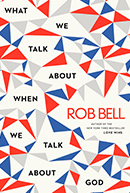Will God be left behind? An interview with Rob Bell (part one)
According to The New York Times, Rob Bell is "one of the most influential Christian leaders in the country." More than 2.5 million of his Nooma films have been sold, thousands flock to arenas to hear him speak, and he even earned a coveted spot in 2011's "TIME 100." Depending on your theological leanings, Rob's influence is an occasion for either rejoicing or lamentation. While some claim that he represents the future of American Christianity, others think that his more progressive ideas have strayed so far from orthodox Christianity that they are actually heretical. His 2011 book, Love Wins: A Book about Heaven, Hell, and the Fate of Every Person Who Ever Lived, for example, challenged the notion that those who do not believe in Christ will spend eternity separated from God in hell. Today, Rob has released a new book titled, What We Talk About When We Talk About God. The text across the back of the book asks, "Will God be left behind?" In it, Rob attempts to survey popular language and ideas applied to God by Christians in light of a culture that is finding those conceptions increasingly irrelevant. Unlike some of his past critics, I read Rob's new book from cover to cover. I enjoyed many parts of it, while others made me squirm in my seat a little. Because I am committed to dialoguing with thought leaders across the spectrum of Christianity through "On Faith & Culture," I took some time to sit down with Rob and discuss his most recent work. The following is part one of my interview:
JM: There is always a lot of pressure after an author experiences that kind of success you did with Love Wins. Sometimes authors don’t know where to go next. Why did you decide that What We Talk About When We Talk About God should be your next book?
RB: You know, for me, it’s always been that there’s way too much in my head and heart to write about. For me, the problem has never been what I should write about. It’s always been what, of all of these ideas, I should actually give my full energy to. So, there’s generally four or five books rattling around in there and the ideas that form the backbone of this new book, they’ve been percolating for a while. Generally, I just pick the idea that seems to be the closest to the surface and jump in. If there’s any particular reason, it was probably just a lot of conversations with people where I kept thinking this book could really help.
JM: You talk about God being a bit like Oldsmobiles, something for the past or for then, not now. In your mind, does God change or do humans just learn more about who God has always been?
RB: Yes, I think that we are, as humans, endlessly learning and growing in our awareness of the God who has always been there. So B, in your two options.
JM: Though you believe the Enlightenment was a good thing in some ways, you say, “as reason and logic became more and more prominent, other ways of knowing became less emphasized.” What are other ways of knowing, other than the intellect, that you think have been lost among Christians and need to be recovered?
RB: I wasn’t specifically writing about Christians there. I was writing about those of us in the Western world as a whole. But I might answer by pointing to the enduring power of music and how people will talk about an album that really got them through a tough time or a song that really spoke to them and the lyrics have almost nothing to do with that person’s life situation. You know what I mean? There’s this sense in which as that music really spoke to them powerfully.
Often times, knowledge bypasses this sort of ridged, rational analysis that we are so used to running everything through, and it speaks right to our hearts. There’s something beautiful and it inspires us and yet when asked to articulate why, we end up talking about how we like the colors or we like the shape or we like the form of that sculpture. I think that would be an example in which there is truth, but it is not in a rational, logical, unfolding linear sort of way.
[ad name="a-faith-of-you-own"]

